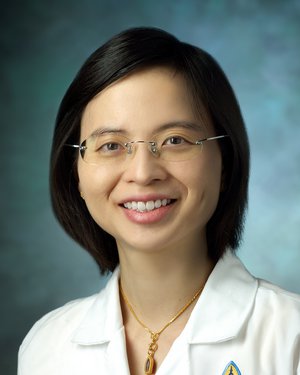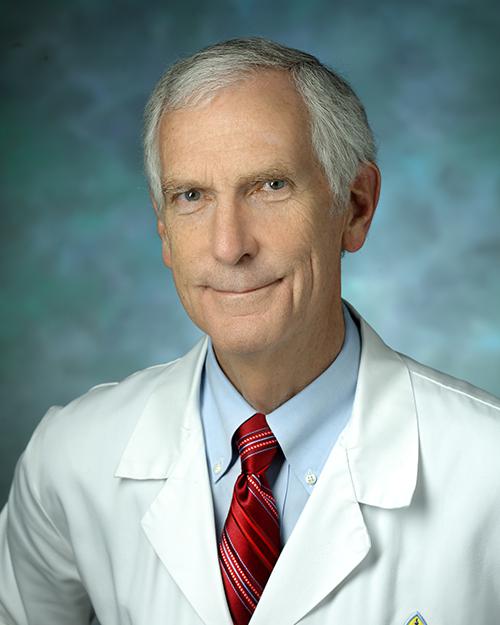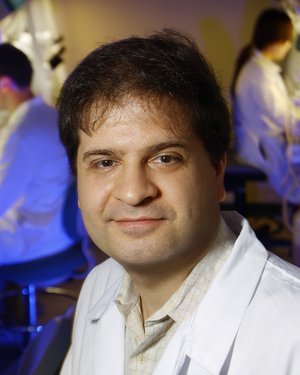Research Lab Results
-
Shyam Sundar Biswal Lab
xResearch in the Shyam Biswal Lab focuses on therapeutic resistance of cancer due to a gain-of-function mutation in transcription factor Nrf2. Using patient-derived xenografts in humanized immunocompetent mice and GEM models, we aim to understand the mechanisms of oncogenic cooperation and metabolic adaptation in cancer cells. We’re also investigating the systemic and pulmonary effects of air pollution as well as the health effects of recent tobacco products, such as electronic cigarettes and water pipes.
-
Saowanee Ngamruengphong Lab
Research in the Saowanee Ngamruengphong Lab focuses on methods for diagnosing and managing gastrointestinal conditions, including premalignant and malignant lesions of the gastrointestinal tract, esophageal cancer, colon polyps, and biliary and pancreatic disease. Our most recent work includes investigating a novel hybrid technique for closure of refractory gastrocutaneous fistula. We also conducted an international multicenter study that compared endoscopic ultrasound-guided pancreatic duct drainage with enteroscopy-assisted endoscopic retrograde pancreatography following Whipple surgery.
-
Shawn Lupold Laboratory
The Shawn Lupold Laboratory studies the biology of urologic malignancies, like prostate cancer, to create new experimental diagnostic, prognostic and therapeutic agents. -
Saraswati Sukumar Lab
Our lab is focused on using comprehensive gene expression, methylation and sequencing and metabolomics analysis to identify alterations in breast cancer, and exploiting these for early detection and therapy. Among deferentially expressed genes, our lab has focused on the HOX genes. HOX genes are intimately involved in the development of resistance to both chemotherapy and to agents targeting the estrogen receptor. Our work explores the alternate pathways that are activated by HOX proteins leading to this resistance and novel treatments to overcome resistance in both tissue culture and xenograft models. In addition, epigenetically silenced genes and a metabolic reprogramming in tumors also trigger novel early detection and therapeutic strategies. We are testing the utility of differentiation therapy through reactivating RAR-beta in breast cancer using histone deacetylase inhibitors with great success. Also, we are targeting enzymes involved in gluconeogenesis and glycolysis with small molecule FDA-approved antimetabolites to achieve antitumor effects.
-
Systems Biology Laboratory
The Systems Biology Lab applies methods of multiscale modeling to problems of cancer and cardiovascular disease, and examines the systems biology of angiogenesis, breast cancer and peripheral artery disease (PAD). Using coordinated computational and experimental approaches, the lab studies the mechanisms of breast cancer tumor growth and metastasis to find ways to inhibit those processes. We use bioinformatics to discover novel agents that affect angiogenesis and perform in vitro and in vivo experiments to test these predictions. In addition we study protein networks that determine processes of angiogenesis, arteriogenesis and inflammation in PAD. The lab also investigates drug repurposing for potential applications as stimulators of therapeutic angiogenesis, examines signal transduction pathways and builds 3D models of angiogenesis. The lab has discovered over a hundred novel anti-angiogenic peptides, and has undertaken in vitro and in vivo studies testing their activity under different conditions. We have investigated structure-activity relationship (SAR) doing point mutations and amino acid substitutions and constructed biomimetic peptides derived from their endogenous progenitors. They have demonstrated the efficacy of selected peptides in mouse models of breast, lung and brain cancers, and in age-related macular degeneration.
-
Jeff Bulte Lab
The clinical development of novel immune and stem cell therapies calls for suitable methods that can follow the fate of cells non-invasively in humans at high resolution. The Bulte Lab has pioneered methods to label cells magnetically (using tiny superparamagnetic iron oxide nanoparticles) in order to make them visible by MR imaging. While the lab is doing basic bench-type research, there is a strong interaction with the clinical interventional radiology and oncology groups in order to bring the methodologies into the clinic.
-
Jungsan Sohn
Dr. Sohn's lab is interested in understanding how biological stress-sensors are assembled, detect danger signals and initiate stress response. Innate immunity is the first line of defense against invading pathogens in higher eukaryotes. We are using in vitro quantitative biochemical assays and mutagenesis and x-ray crystallography to investigate the underlying operating principles of inflammasomes, a component of the innate immune system, to better understand biological stress sensors. -
VISION: To make MRI more equitable and inclusive
MISSION: To develop and deploy MRI tools and methods to enable accessible imaging of underserved populations
-
Brent Petty Lab
Dr. Petty's laboratory interests focuses on antimicrobial chemotherapy, hospital-based medical practices, and internal medicine collaboration with ophthalmologic clinical trials.
-
Zambidis Laboratory
The Zambidis Labratory studies the formation of pluripotent stem cells and the subsequent hematopoietic, endothelial and cardiac differentiation, as well as the potential therapeutic uses of pluripotent stem cell-derived cells.



